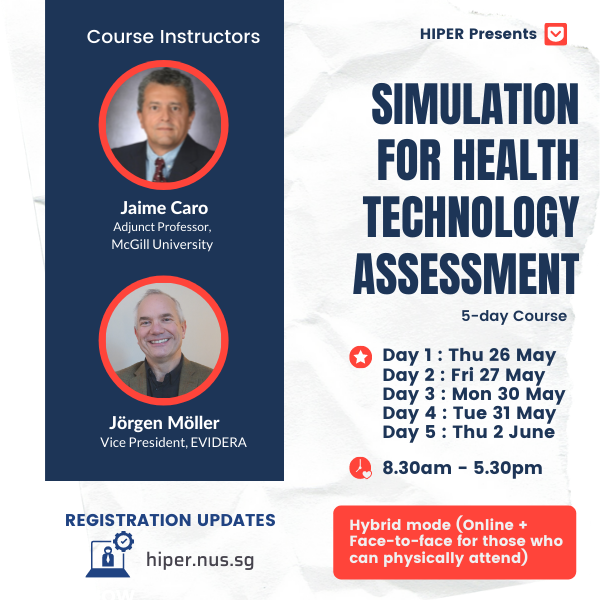SHORT MODULE (SPH5423)
Simulation for HTA
Registrations close on 30th April 2022
Date: 26, 27, 30, 31 May and 2 June (5 days) 2022
Time: 8.30am – 5.30pm (SGT)
* there may be slight change in the date and timing
Course outline
This module is designed to equip students with the conceptual understanding and technical skills to design and construct simulations relevant to health technology assessment (HTA). After reviewing the fundamentals of modelling for HTA, the implementation of stochastic individual-level models will be addressed, including the specification and use of distributions, the structuring of these models using the DICE methodology, and the approach to analyses, interpretation and presentation.
Learning outcomes
At the end of the course, participants will be able to:
- Understand what a simulation is, how and when to use it within its limitations
- Select and apply the appropriate probability distributions to describe patient trajectories in a healthcare simulation
- Implement these distributions in a coherent structure
- Validate the resulting simulations
Analyze scenarios, report results and interpret them.
Topics to be covered
- Modeling for HTA – basics
- What is DICE?
- A Markov model in DICE
- Uncertainty
- Intro to distributions
- Time-to-event models
- Conditional equations
- Sequential equations
- Validation
Pre-requisites
- Must have prior experience with Markov cohort models
- Have the latest version of working Microsoft Excel (Windows or Mac) downloaded in laptops
Course instructors
 |
Jaime Caro Adjunct Professor, Faculty of Medicine and Health Sciences, McGill University Dr Caro is Chief Scientist at Evidera where he advances Evidera’s leadership in developing and applying novel techniques in modeling, health economics, comparative effectiveness, epidemiology, and outcomes research. Dr. Caro is also adjunct Professor of Medicine, Epidemiology and Biostatistics at McGill University, and Professor in Practice at the London School of Economics. He also lends his teaching ability to other academic institutions such as Thomas Jefferson University School of Population Health and Saw Swee Hock School of Public Health, National University of Singapore. Dr. Caro continues to pioneer new methodologies. In an effort to provide an alternative to the well-known cost per QALY technique and avoid many of the latter’s problems, he is working on a broader approach to valuing health benefits. He is also further developing DICE, the unified approach to health economic modeling that he has created. Working with health technology assessment agencies and academic groups, he is formalizing this innovation to enable rapid, standardized and less error-prone development of decision-analytic model. On behalf of the German health technology assessment agency, he proposed an innovative approach to the assessment of health technologies, involving the efficiency frontier. As part of his work with governments, he has helped the World Bank Institute and the InterAmerican Court for Human Rights address the growing problem of Supreme Courts overriding health care system decisions and ordering them to provide treatments that had been considered unwarranted. After leading the Quality Assurance for Modeling Studies Task Force, jointly sponsored by ISPOR, Academy of Managed Care Pharmacy and the National Pharmaceutical Council, and the ISPOR-SMDM Good Modeling Practices Task Force, endorsed by the Society for Medical Decision Making, Dr. Caro was recently named co-chair of the ISPOR Science and Research Committee and has been awarded the Marilyn Dix Smith Leadership Award. |
 |
Jörgen Möller Vice President, EVIDERA Jörgen specializes in simulating complex systems and played a key role in simulating the re-design of the Swedish national postal distribution system, the extension of Stockholm-Arlanda Airport, and the utilization of surgical theatres at Eskilstuna Hospital. Jörgen is also an Honorary Visiting Associate Professor with the Saw Swee Hock School of Public Health, National University of Singapore. Intrigued by the dearth of simulation in pharmacoeconomics and outcomes research, Jörgen joined Caro Research (now part of Evidera) in 2003 as a specialist in discrete event simulation (DES) and has been instrumental in implementing DES as a modeling tool in HTA. His focus has been on translating methods from operations research to pharmacoeconomics and on developing guidelines for this type of modeling. Jörgen has created more than thirty DES models in the areas of devices and pharmaceuticals. Since discretely integrated condition-event modeling was devised by Dr. J. Jaime Caro in 2016 Jörgen has been deeply involved in the development of the technical platforms for the Discretely Integrated Condition Event (DICE) simulation. He also conducts advanced training courses in DES, the ARENA-software, and DICE. Jörgen received an MSc-degree in mechanical engineering at Lund University, Sweden. |
Read the post-workshop report from this workshop held in January 2021.
For more information on this course, please contact us at hiper@nus.edu.sg

